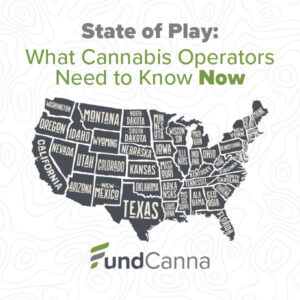Traditional methods of debt collection and accounts receivable have failed.
Written by John Schroyer - Green Market Report
The increasingly systemic problem in the U.S. cannabis industry of cash-strapped companies not paying their bills has led more businesses attempting to develop solutions to address the problem.
Although the issue first gained headlines in the sprawling California marijuana market, it has expanded to several other states in recent months. And at least three efforts to address it have cropped up in marijuana business circles, including:
- California-based FundCanna‘s offer of instant-underwriting for wholesale purchases.
- New York-based LeafLink guaranteeing payment for purchases made through its online platform.
- An anonymously-run website called “Cannabis Credit Scores” for licensed California companies, complete with a so-called “shit list” of bad actors.
All of the initiatives work in different ways, and two of the three are paid services by private ancillary firms that are out to make a buck of their own, but all three target the same underlying problem: How to best ensure cannabis companies get paid for their services or products in such an unstable business climate.
“We’re looking to address an issue within the industry that has impacted us and many people we’ve worked with,” said one of the founders of Cannabis Credit Scores, who requested anonymity to openly discuss the site but disclosed they’re in the marijuana cultivation sector. “It’s not about collections for us. Once you hit collections, it’s too late. It’s about preemption.”

Like blood from a stone
“We’ve seen many people who have been farming for generations that have gone out of business, lost their land, lost their houses, all because they didn’t have the information to know who to trust and who not to trust,” the CCS founder said. “It’s not much different than back in the day when you’d get pistol-whipped and robbed in a parking lot. Now it’s just a white collar.”
Adam Stettner, the CEO of FundCanna, said it’s only relatively recently that proactive solutions for the problem have begun emerging, and to date, most traditional bill collection approaches for cannabis companies have been like trying to squeeze blood from a stone.
“Calling a lawyer and threatening that guy is not going to solve the problem,” Stettner said.
Nationwide, cannabis payment delinquencies are nearing $4 billion, according to a report earlier this year by Whitney Economics. “All the lawyers and debt collectors, they’re just bringing a bucket and mop… There is a solution here,” Stettner said.
The Models
While the FundCanna and LeafLink approaches are capitalistic – new paid services offered by private companies for a fee – the Cannabis Credit Scores website is user-driven and completely free of charge.
In short, it’s about naming names, both good and bad.
“A few weeks ago, we started sending out the shit list en masse,” the founder of Cannabis Credit Scores said, explaining that the idea is to get out ahead of the problem for small companies like theirs.
“Once it hits collections, you’re too late. It’s more about information preemptively deciding who to work with and who not to work with, and hopefully pushing the bad players out more quickly,” the founder said. “The reality is, if you don’t pay your bills, you’re not long for this world. The shorter that time is, the less damage will be done to the industry.”
By contrast, FundCanna and LeafLink offter more than just intel on supposed bad actors; they’re offering actual financial services to help temporarily cover expenses for cannabis businesses looking for help managing their cash flow, inventory and transaction timing so they don’t get overextended.
With the LeafLink solution – dubbed PoST, for Payment on Sell Through – companies doing business on the website can rely on the platform itself to guarantee payments, a service that debuted in June. It relies on monitoring products and brands that are selling, how fast they’re moving and what needs restocking, along with the capital abilities of both the sellers and buyers in order to avoid disconnects.
“What PoST intends to do is reward brands who are really good at moving products through the store. So if you’re a brand and you put the right marketing in place and you allow that retailer to get more consumers in the door, you get paid faster, even faster than you were previously getting terms on,” LeafLink Chief Product Officer Matt Hutchinson said. “Because of the different mechanisms we have in place, we also can guarantee that payment.”
“This is a dynamic payment term that is backed via something similar to a trade credit insurance policy, is the simplest way to think about it. It’s not consignment. It’s dynamic payment terms,” Hutchinson explained.
LeafLink simply takes a small cut of each transaction for its role.
The program has already rolled out in Colorado, Michigan, Mississippi and Oregon, and LeafLink plans to debut it in other states as well.
FundCanna’s new service, called ReadyPaid, only hit the market in September, and it’s so new that it’s not even fully functional yet, CEO Adam Stettner told Green Market Report. But the way it’ll work is essentially as a short-term loan to cover inventory purchases. Eligible companies can qualify for $25,000 immediately, Stettner said, up to $1 million in a single day, and more than $1 million in two to three days.
Companies will have to apply for financing and prove their creditworthiness, but the terms are such that businesses will be able to use the cash for whatever they need.
With ReadyPaid, Stettner said, there’s no charge to companies if they repay the loan within 30 days. After that period, interest begins accruing at about 2%-3% a month for up to six months.
Although FundCanna announced the new offering about two months ago, interest skyrocketed immediately, Stettner said, with upwards of 100 businesses signing up despite almost zero marketing efforts.
“It was very well received. ‘Please do this. We would use it. We know our clients would use it and it would be a godsend for us,'” Stettner recounted hearing from clients.
“What we’re really doing now is, the seller has no more (accounts receivable balances) because we’re paying them on day zero. The buyer doesn’t have any (accounts payable) stress and doesn’t have to be this person that’s bouncing from supplier to supplier,” Stettner said.
Will it work?
Each of the three – Hutchinson, Stettner and the founder of Cannabis Credit Scores – said they’re hopeful that their approach will make a real difference for struggling cannabis companies, but it’s not really clear yet what will truly break the vicious cycle.
That’s because the underlying problem has several causes, meaning there likely isn’t just one silver bullet. But the consensus among the three is that the traditional methods of collecting on bills isn’t doing the trick, so something new is needed.
Hutchinson said a lot of operators feel like they’re between a rock and a hard place, that they’re forced to do business with potentially bad actors simply because they’re desperate for revenue. So a solution, he said, needs to start with foundational trust between players.
“People are starving, and so they’ve got to sell to these stores” that aren’t paying their bills, Hutchinson said. “…Collaboration and trust in the supply chain operators is at the core of how you actually solve the problem.”
Stettner agreed, and emphasized that what he thinks cannabis companies truly need – and that has been denied to them thus far from mainstream financial institutions – is flexibility.
“If somebody offers flexibility on cashflow and payments, it becomes irresistible. Every industry has flexibility. So you need that. So we’re providing that,” he said. “If I don’t have to worry about whether or not I’m going to get paid, it’s kind of like a no-brainer.”
Get the working capital you need. Fast.
Approvals in as little as 24 hours
Share this article on
More From Our Blog
Follow Us
Explore
info@fundcanna.com














